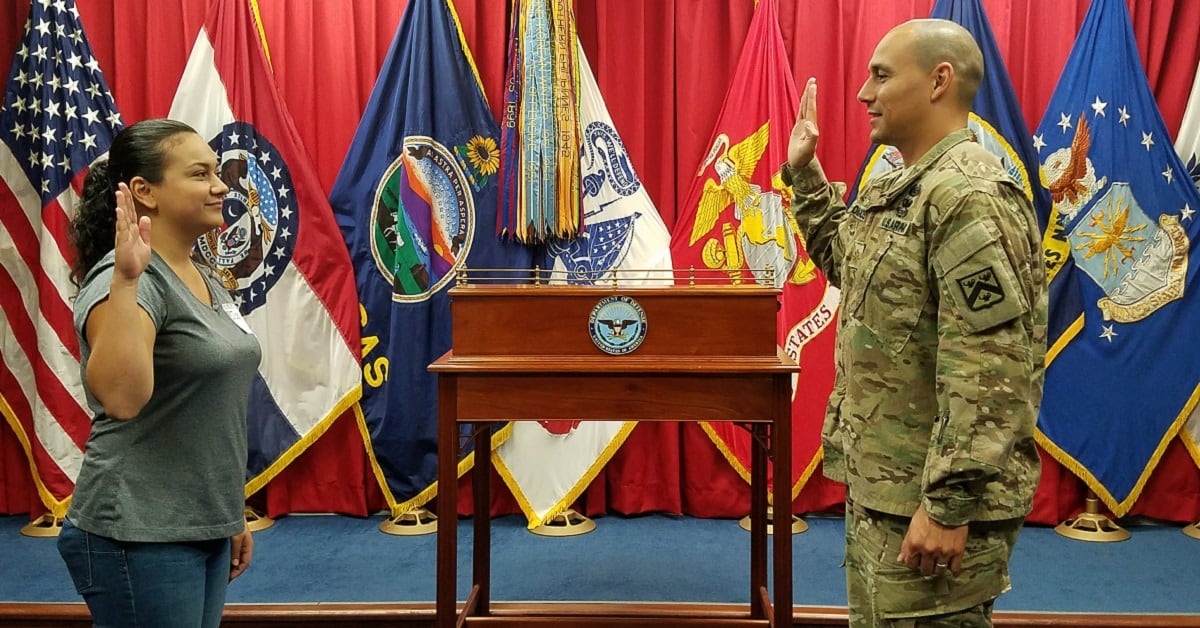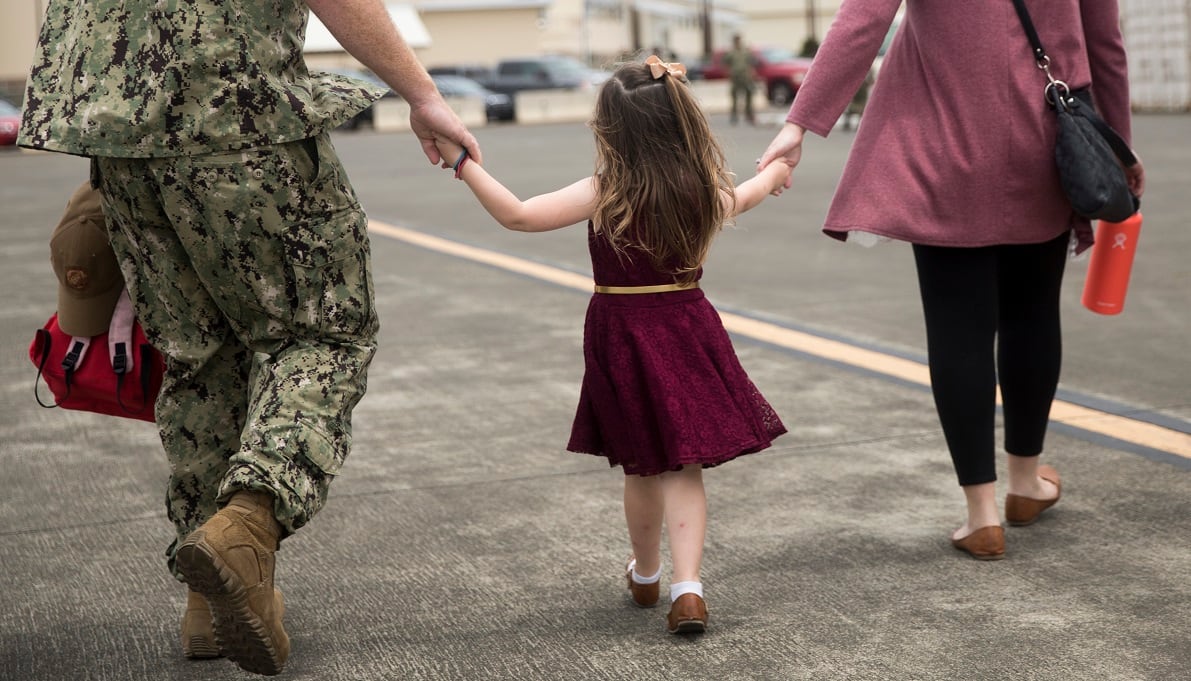More than two years after a military daughter began her battle to enlist in the military — despite notations made in her dependent medical record when she was a young teen — she has graduated from Air Force basic military training.
Samantha De La Rosa first tried to enlist in the Army in April 2017, but was denied entry because of notations in her military dependent medical records that had been made when she went for behavioral health counseling in her youth. Neither she nor her parents knew that the notations were in her records, and vehemently denied the accuracy. She applied for waivers to allow her to enlist, and the Army denied her multiple times.
“She never gave up,” said her father, Army Lt. Col. Rudy De La Rosa. “She kept gathering more and more letters of recommendation and clean bills of health, illustrating that she was a prime candidate for military service.”
Samantha’s older sister Juliet, who was forced out of Air Force basic training in October 2016 for the same reason, was there to watch her sister graduate May 10. “Juliet said the whole time that it was surreal being back at Lackland, but that she felt Samantha graduated for the both of them,” De La Rosa said.
De La Rosa pushed his concerns about the previously unknown — and incorrect — notations in his daughters’ dependent medical records and their inability to get waivers up the chain of command and to Congress. He also went public with his story.
He says he has since seen a climate change in DoD. “The entire DoD, we’ve been told, has been approving waivers for worthwhile cases like Samantha’s,” he said.
“The way things are now — finally — military parents can take their kids to get help through the behavioral health care system without worrying about crushing their kids’ dreams of one day serving in the military,” De La Rosa said.
“Because no matter the diagnosis as a kid, if they are fully qualified later in life, they will get legitimate due process for a waiver; and they’ll get a waiver if they deserve one.”
RELATED

It’s an issue that is more pressing for military dependents, because once they enter the military, their dependent medical records are merged with their new military medical record. If a recruit mistakenly or knowingly fails to disclose something potentially disqualifying at the military entrance processing stations, the military may never know about it — unless that recruit is a military dependent. Medical records of recruits from civilian families are not available to the military.
This affected military dependents more, De La Rosa contends, “because their records were so heavily documented, and because they’d been so highly encouraged to seek behavioral health treatment over the course of their lives.” In addition, he said, “being a military kid is very hard, and DoD itself anticipates higher numbers of behavioral health challenges that are inherent to adolescence when compounded by the military lifestyle.”
Following Military Times’ reporting on the issue, other parents notified Military Times about similar problems of notations in their children’s medical records that they weren’t aware of, that resulted in their child being forced out of basic training. The DoD Military Family Readiness Council is exploring the issues of whether children whose parents encouraged them to seek behavioral health care are being barred from the service.
RELATED

Samantha’s waiver to join the Air Force was approved in December 2018 within a couple of weeks after she submitted it, De La Rosa said. She’s proving her mettle: Her physical training in basic was so strong, he said, that she served as a peer coach and mentor for other trainees who were struggling. Her flight got physical training honors. After graduating from basic, Samantha moved on to technical school, where she is studying to be an aviation resource manager.
De La Rosa and his wife, Mia, had taken Samantha and her older sister Juliet to behavioral health for guidance and help in dealing with issues related to multiple moves and her father’s deployments that many military children face. The girls and their parents had no idea that certain terms were entered into their medical records, and vehemently denied those descriptions, which would bar them from military service. No one ever told the parents of any such possible diagnosis, and no medication was ever prescribed, nor was either daughter ever hospitalized. And they believed that those records of counseling were confidential.
That is, until older sister Juliet was forced out of Air Force basic training in late 2016. Juliet was stunned when an Air Force medical provider asked her about a notation in her dependent medical records related to counseling. She had to fight allegations that she had committed fraud in enlisting. She and her parents had no idea there was such a notation, and requested a copy of her records. Although she was given a clean bill of health by multiple civilian and military behavioral health providers, she was denied her requests for a waiver.
After Juliet’s experience, Samantha and her parents requested her medical records and discovered there were negative notations there, too. So Samantha informed her recruiter about those notations up front, and was told she couldn’t join the Army, and that a waiver wasn’t an option. The Army denied her a waiver multiple times.
When they saw Samantha running in the pre-graduation formation, “we were overwhelmed with pride and relief,” De La Rosa said.
“It truly felt like a victory for not only Samantha, but for our whole family, everyone who supported us, and the many applicants who have benefited and will benefit” from the climate change within DoD, he said.
“It also felt like a vindication for Juliet, who was not given the same opportunity to clear up her records and process fairly for a waiver because we didn’t know what we didn’t know back then.” Although he is confident Juliet could get back into the Air Force if she wanted to, he said, now that her record has also been fully corrected and updated, she is happy where she is, studying to be a veterinary technician, he said, adding she just finished her first year of school, and earned a 3.8 grade-point average.
“I was filled with enormous pride to see another De La Rosa serving in uniform. Samantha is the first of her generation to serve, creating a legacy of four generations in all to have served,” said De La Rosa, who will retire from the Army on July 1.
“I truly feel like the torch has been passed, and that I can retire in peace.”
Karen has covered military families, quality of life and consumer issues for Military Times for more than 30 years, and is co-author of a chapter on media coverage of military families in the book "A Battle Plan for Supporting Military Families." She previously worked for newspapers in Guam, Norfolk, Jacksonville, Fla., and Athens, Ga.





